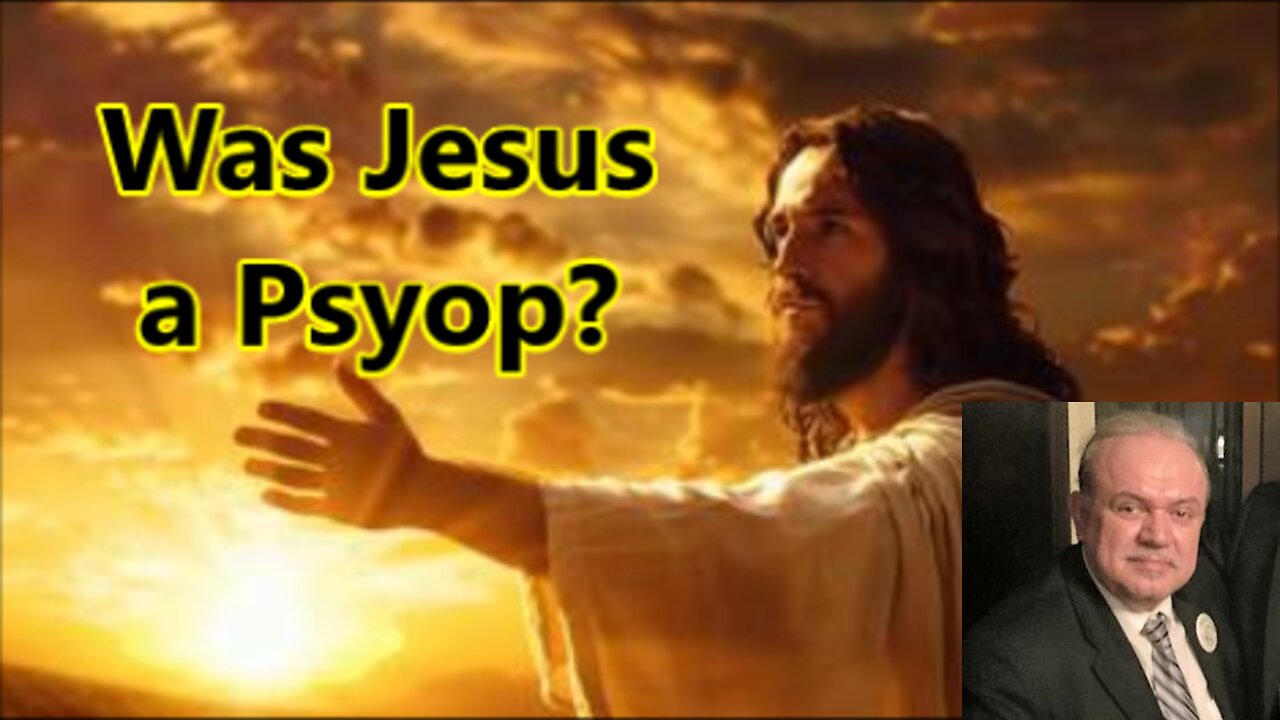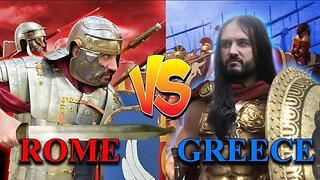Premium Only Content

Did Paul and the Pharisees Create Jesus as a Psyop to Undermine Rome? Pete Papaherakles
Our first video on this was 2.5 hours long so we redid it under one hour, here. Pete Papaherakles and Brian discuss the theory that Paul and the Pharisees created Jesus as a psyop to undermine Rome. They reference Richard Carrier's work, suggesting a one in three chance that Jesus existed. They question the historical evidence, noting the lack of mention by contemporary historians like Josephus and Philo. They explore the idea that Jesus was initially a celestial deity, later transformed into a historical figure. They also discuss the integration of Jewish elements into Christianity, suggesting a long-term plan by the Pharisees to dominate the world through deception and economic control.
See the Pete Papaherakles playlist of videos at https://old.bitchute.com/playlist/3U7qDqfXKIq7/ .
Outline
Historical Evidence and Lack of Mention of Jesus
• Pete discusses the lack of historical evidence for Jesus, noting that no historian of the time wrote about him.
• Pete mentions Josephus and Philo of Alexandria, who did not mention Jesus, despite being prominent Jews of the time.
• Pete explains that Philo was well-connected and would have known about Jesus if he existed.
• Pete suggests that the lack of mention by Philo is suspicious and indicates that Jesus may not have existed.
The Role of Josephus and Tacitus
• Pete discusses Josephus's credibility, noting that some believe his mention of Jesus was added later by Christians.
• Pete mentions Tacitus, who is said to have gotten his information on Jesus from Josephus.
• Pete questions the accuracy of Tacitus's account, given the doubts about Josephus's credibility.
• Pete notes that both Josephus and Tacitus's accounts are suspect and may not provide reliable evidence for Jesus's existence.
The Transformation of Jesus from Celestial Deity to Historical Figure
• Pete explains that Paul initially wrote about Jesus as a celestial deity, not a historical figure.
• Brian mentions Richard Carrier's book "Jesus from Outer Space" and the idea that Jesus was a celestial being.
• Pete discusses how later gospel writers like Mark and Matthew made Jesus appear as a historical figure.
• Pete notes that the gospel writers embellished the story of Jesus, adding miracles and other details.
The Role of Paul and the Pharisees
• Pete suggests that Paul and the Pharisees may have created Jesus as a psyop to undermine Rome.
• Pete mentions Edward Gibbon's view that Christianity contributed to the decline of the Roman Empire.
• Pete discusses the idea that the Pharisees wanted to create a religion that would make the Jews more powerful and undermine Rome.
The Influence of Greek Philosophy on Christianity
• Pete explains that later gospel writers like Luke and John incorporated Greek philosophy into their writings.
• Pete mentions that John's gospel was written for Greeks and included many Greek philosophical concepts.
• Pete notes that the incorporation of Greek philosophy made Christianity more appealing to Gentiles.
• Pete suggests that the Pharisees may have seen the potential in using Greek philosophy to make Christianity more palatable to Gentiles.
The Role of the Old Testament in Christianity
• Pete discusses the prominence of the Old Testament in the King James Bible.
• Pete notes that the Old Testament was more prominent on the cover of the King James Bible than the New Testament.
• Pete explains that the Old Testament was integrated into Christianity, making Judaism more appealing.
• Pete suggests that the Pharisees may have seen the potential in using the Old Testament to make Christianity more appealing to Jews.
The Long-Term Plan of the Pharisees
• Pete questions when the Pharisees planned the integration of the Old Testament into Christianity.
• Pete suggests that the Pharisees may have had a long-term plan to integrate the Old Testament into Christianity and to dominate the world through religion.
The Influence of Communism and the Protocols of the Elders of Zion
• Pete compares communism to Christianity without God, noting that communism appeals to the same ideas of equality and salvation.
• Pete suggests that the same group of people who created Christianity may have also created communism.
• Pete mentions the Protocols of the Elders of Zion, which outline a plan to conquer the world by “peaceful” means.
• Pete notes that the Protocols suggest that the same group of people who created Christianity may have also created communism.
Conclusion and Final Thoughts
• Brian and Pete wrap up the discussion, noting that the theory is reasonable but not definitively proven.
• Pete reiterates the idea that Christianity may have been a psyop created by the Pharisees to undermine Rome.
• Pete suggests that the Pharisees may have seen the potential in using religion to dominate the world.
-
 19:53
19:53
MetatronHistory
19 hours agoRome VS Greece - Ultimate Clash of Civilizations Explained
38.7K9 -
 LIVE
LIVE
The Big Mig™
5 hours agoThe Big Mig Show's Greatest Hits w/ Americas Future, Karmageddon, Operation Gideon,..
193 watching -
 1:32:33
1:32:33
VapinGamers
4 hours ago $5.21 earnedTools of the Trade - EP12 The Art of Story Telling with MidnightinTheMountains - !rumbot !music
23.6K2 -
 3:09:50
3:09:50
SOLTEKGG
3 hours ago🔴LIVE - Battlefield 6 - Going Pro in RED SEC
16.1K1 -

Midnight In The Mountains™
5 hours agoThe Midnights Play Arc Raiders | Loot Scoot and KILL | Crypto Wallet up n running GO JOIN THE BETA!
14.7K3 -
 53:25
53:25
X22 Report
6 hours agoMr & Mrs X - Trump Is Using The Same Tactic As Our Founding Fathers To Rebuild America - EP 17
89K28 -
 3:15:31
3:15:31
PudgeTV
3 hours ago🟣 Arc Raiders - Gaming on Rumble | Going Topside w My Daughter’s Husband
14K1 -
 2:05:43
2:05:43
LFA TV
23 hours agoRUMBLE RUNDOWN WEEK 7 with SHAWN FARASH 11.22.25 9AM
148K9 -
 3:23:01
3:23:01
ttvglamourx
4 hours ago $1.15 earnedGLAMOURX VS CALL OF DUTY LOBBIES !DISCORD
18.4K3 -
 LIVE
LIVE
DannyStreams
6 hours agoSaturday Morning Tarky
37 watching